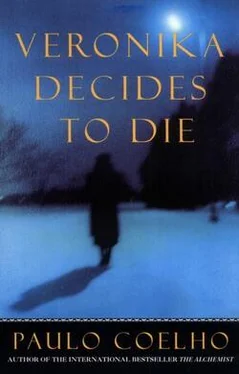“You can’t speak. You don’t live in this world, you don’t know that my name’s Veronika. You weren’t with me last night; please, say you weren’t there.”
“I was.”
She took his hand. The lunatics were shouting, applauding, making obscene remarks.
“Where are they taking you?”
“For some treatment.”
“I’ll come with you.”
“It’s not worth it. You a just be frightened, even if I swear to you that it doesn’t hurt, that you don’t feel anything. And it’s much better than sedatives because you recover your lucidity much more quickly.”
Veronika didn’t know what he was talking about. She regretted having taken his hand, she wanted to get away from there as soon as possible, to hide her shame, never again to see that man who had witnessed all that was most sordid in her, and who nevertheless continued to treat her with such tenderness.
But again she remembered Mari’s words: She didn’t need to explain her life to anyone, not even to the young man standing before her.
“I’ll come with you.”
The nurses thought it might be better like that. The schizophrenic no longer needed to be restrained; he was going of his own free will.
When they reached the ward, Eduard lay down on the bed. There were two other men waiting, with a strange machine and a bag containing strips of cloth.
Eduard turned to Veronika and asked her to sit down on the bed.
“In a few minutes the story will be all round Villete, and people will calm down again, because even the craziest of the insane feel fear. Only someone who has experienced this knows that it isn’t as terrible as it seems.”
The nurses listened to the conversation and didn’t believe a word of what the schizophrenic was saying. It must hurt terribly, but then, who knows what goes on inside the head of a lunatic? The only sensible thing the young man had said was about fear: The story would soon be all round Villete and calm would swiftly be restored.
“You lay down too soon,” said one of them.
Eduard got up again, and they spread a kind of rubber sheet beneath him.
“Now you can lie down.”
He obeyed. He was perfectly calm, as if everything that was happening was absolutely routine.
The nurses tied some of the strips of cloth around Eduard’s body and placed a piece of rubber in his mouth.
“It’s so that he doesn’t accidentally bite his tongue,” said one of the men to Veronika, pleased to be able to give some technical information as well as a warning.
They placed the strange machine—not much larger than a shoe box, with a few buttons and three dials on it—on a chair by the bed. Two wires came out of the top part and were connected to what looked like earphones.
One of the nurses placed these “earphones” on Eduard’s temples. The other seemed to be regulating the machine, twiddling some knobs, now to the right, now to the left. Although he couldn’t speak because of the piece of rubber in his mouth, Eduard kept his eyes fixed on hers and seemed to be saying: “Don’t worry, don’t be afraid.”
“It’s set at 130 volts for 0.3 seconds,” said the nurse controlling the machine. “Here goes.”
He pressed a button and the machine buzzed. At that moment, Eduard’s eyes glazed over, his body thrashed about on the bed with such fury that, but for the straps holding him down, he would have broken his spine.
“Stop it!” shouted Veronika.
“We have,” said the nurse, removing the “headphones” from Eduard’s temples. Even so, Eduard’s body continued to writhe, his head rocking from side to side so violently that one of the men had to hold it still. The other nurse put the machine in a bag and sat down to smoke a cigarette.
The scene lasted a matter of moments. Eduard’s body seemed to return to normal, but then the spasms recommenced, and the nurse had to redouble his efforts to keep Eduard’s head still. After a while the contractions lessened, until they finally stopped altogether. Eduard’s eyes were wide open, and one of the nurses closed them, as one does with the dead.
Then he removed the piece of rubber from Eduard’s mouth, untied him, and put the strips of cloth in the bag along with the machine.
“The effects of electric shock treatment last about an hour,” he said to the girl, who was no longer shouting and who seemed mesmerized by what she was seeing. “It’s all right, he’ll soon be back to normal, and he’ll be calmer too.”
As soon as the electric charge took effect, Eduard felt what he had experienced before: His normal vision gradually decreased, as if someone were closing a curtain, until everything disappeared. There was no pain or suffering, but he had seen other people being treated with electric shock, and he knew how awful it looked.
Eduard was at peace now. If, moments before, he had experienced the stirrings of a new emotion in his heart, if he had begun to understand that love was something other than what his parents gave him, the electric shock treatment—or electroconvulsive therapy (ECT), as the specialists preferred to call it—would certainly restore him to normality.
The main effect of ECT was to destroy short-term memory. There would be no nurturing of impossible dreams for Eduard. He could not continue looking forward to a future that did not exist; his thoughts must remain turned toward the past, or he would again begin wanting to return to life.
An hour later Zedka went into the ward, almost empty except for a bed where a young man was lying, and a chair, where a young woman was sitting.
When she got closer she saw that the young woman had been sick again, and that her bent head was lolling slightly to the right.
Zedka turned to call for help, but Veronika looked up.
“It’s all right,” she said. “I had another attack, but it’s over now.”
Zedka gently helped her up and led her to the toilet.
“It’s a men’s toilet,” Veronika said.
“Don’t worry, there’s no one here.”
She removed Veronika’s filthy sweater, washed it, and placed it on the radiator. Then, she removed her own wool top, and gave it to Veronika.
“Keep it. I only came to say good-bye.”
The girl seemed distant, as if she had lost all interest in life. Zedka led her back to the chair where she had been sitting.
“Eduard will wake up soon. He may have difficulty remembering what happened, but his memory will soon come back. Don’t be frightened if he doesn’t recognize you at first.”
“I won’t be,” said Veronika, “because I don’t even recognize myself.”
Zedka pulled up a chair and sat down beside her. She had been in Villete so long it would cost her nothing to spend a few minutes longer keeping Veronika company.
“Do you remember when we first met? I told you a story to try to explain that the world is exactly as we see it. Everyone thought the king was mad, because he wanted to impose an order that no longer existed in the minds of his subjects.
“There are things in life, though, which, however we look at them, are valid for everyone. Like love, for example.”
Zedka noticed a change in Veronika’s eyes. She decided to go on.
“I would say that if someone only has a short time to live and decides to spend that time sitting beside a bed, watching a man sleeping, then that must be love. I’d go even further: if, during that time, that person has a heart attack, but sits on in silence, just so as to remain close to the man, I would say that such love had a lot of potential for growth.”
“It might also be despair,” said Veronika. “An attempt to prove that, after all, there are no reasons to continue battling away beneath the sun. I can’t be in love with a man who lives in another world.”
Читать дальше








